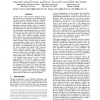Free Online Productivity Tools
i2Speak
i2Symbol
i2OCR
iTex2Img
iWeb2Print
iWeb2Shot
i2Type
iPdf2Split
iPdf2Merge
i2Bopomofo
i2Arabic
i2Style
i2Image
i2PDF
iLatex2Rtf
Sci2ools
164
click to vote
SIGMOD
2004
ACM
2004
ACM
Robust Query Processing through Progressive Optimization
Virtually every commercial query optimizer chooses the best plan for a query using a cost model that relies heavily on accurate cardinality estimation. Cardinality estimation errors can occur due to the use of inaccurate statistics, invalid assumptions about attribute independence, parameter markers, and so on. Cardinality estimation errors may cause the optimizer to choose a sub-optimal plan. We present an approach to query processing that is extremely robust because it is able to detect and recover from cardinality estimation errors. We call this approach "progressive query optimization" (POP). POP validates cardinality estimates against actual values as measured during query execution. If there is significant disagreement between estimated and actual values, execution might be stopped and re-optimization might occur. Oscillation between optimization and execution steps can occur any number of times. A re-optimization step can exploit both the actual cardinality and partia...
Accurate Cardinality Estimation | Cardinality Estimation Errors | Database | POP Validates Cardinality | SIGMOD 2004 |
Related Content
| Added | 08 Dec 2009 |
| Updated | 08 Dec 2009 |
| Type | Conference |
| Year | 2004 |
| Where | SIGMOD |
| Authors | Volker Markl, Vijayshankar Raman, David E. Simmen, Guy M. Lohman, Hamid Pirahesh |
Comments (0)

